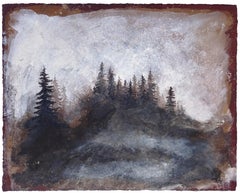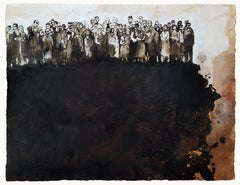Jacques Bouillac Art
to
1
Overall Width
to
Overall Height
to
1
1
1
1
1
1
1
1
1
8,816
2,808
1,655
1,313
1
Artist: Jacques Bouillac
Vintage French Watercolor Landscape - Village Path
By Jacques Bouillac
Located in Houston, TX
Inviting watercolor of a small path winding through a quaint town using soft, cool hues by artist Jacques Bouillac, circa 1950. Signed lower right.
Original one-of-a-kind artwork ...
Category
1950s Jacques Bouillac Art
Materials
Paper, Watercolor
Related Items
"The Faraway Forest", Pigments Watercolor Acrylic Paper Drawing
By Frank Girard
Located in Clermont-Ferrand, Auvergne-Rhône-Alpes
Titled "The faraway forest", this artwork created by Frank Girard, utilizes pigments, Chinese ink, watercolors, acrylics, and colored pencils on 400g/m2 neutral white paper. It remai...
Category
2010s Realist Jacques Bouillac Art
Materials
Paper, Ink, Acrylic, Watercolor, Color Pencil, Pigment
$829 Sale Price
20% Off
H 13.39 in W 17.33 in D 0.02 in
"Persepective", Pigments Watercolor Acrylic Paper Drawing
By Frank Girard
Located in Clermont-Ferrand, Auvergne-Rhône-Alpes
Titled "Perspective", this artwork created by Frank Girard, utilizes pigments, Chinese ink, watercolors, acrylics, and colored pencils on 400g/m2 neutral white paper. It remains unfr...
Category
2010s Realist Jacques Bouillac Art
Materials
Paper, Ink, Acrylic, Watercolor, Color Pencil, Pigment
$829 Sale Price
20% Off
H 13.39 in W 17.33 in D 0.02 in
"The Cold Wind in the Pine Trees", Pigments Watercolor Acrylic Paper Drawing
By Frank Girard
Located in Clermont-Ferrand, Auvergne-Rhône-Alpes
Titled "The cold wind in the pine trees", this artwork created by Frank Girard, utilizes pigments, Chinese ink, watercolors, acrylics, and colored pencils on 400g/m2 neutral white pa...
Category
2010s Realist Jacques Bouillac Art
Materials
Paper, Ink, Acrylic, Watercolor, Color Pencil, Pigment
$829 Sale Price
20% Off
H 13.39 in W 17.33 in D 0.02 in
"Song of Songs Illustration" Watercolor, Old Testament Story, Colors
Located in Detroit, MI
SALE ONE WEEK ONLY
"Song of Songs Watercolor" renders an important bibilical story that is celebrated during Jewish Passover. Song of Solomon, also called Canticle of Canticles, or Song of Songs, an Old Testament...
Category
Mid-20th Century Other Art Style Jacques Bouillac Art
Materials
Paper, Watercolor
$3,400
H 9.25 in W 7.75 in
"The Remote", Pigments Watercolor Acrylic Paper Drawing
By Frank Girard
Located in Clermont-Ferrand, Auvergne-Rhône-Alpes
Titled "The remote", this artwork created by Frank Girard, utilizes pigments, Chinese ink, watercolors, acrylics, and colored pencils on 400g/m2 neutral white paper. It remains unfra...
Category
2010s Realist Jacques Bouillac Art
Materials
Paper, Ink, Acrylic, Watercolor, Color Pencil, Pigment
$829 Sale Price
20% Off
H 17.33 in W 13.39 in D 0.02 in
Irish Study VII - 21st Century, Contemporary, Landscape, Watercolor on Paper
By Ekaterina Smirnova
Located in Barcelona, Catalonia
Watercolor on paper
Atmosphere -masses of evaporating water in the air- describes Ekaterina Smirnova's paintings best. Working in watercolour, Smirnova has a unique approach to this ...
Category
21st Century and Contemporary Contemporary Jacques Bouillac Art
Materials
Paper, Watercolor
"Great Pine", Tree Inhabited by Human in Nature, Drawing and Pigments on Paper
By Frank Girard
Located in Clermont-Ferrand, Auvergne-Rhône-Alpes
This drawing by Frank Girard is created with pigments, Chinese ink, watercolors, acrylic, and colored pencils on 300g/m2 neutral white paper. It is not framed.
Through drawings, the...
Category
2010s Realist Jacques Bouillac Art
Materials
Paper, Ink, Acrylic, Watercolor, Color Pencil, Pigment
$2,519
H 25.6 in W 19.69 in D 0.02 in
Irish Study II - 21st Century, Contemporary, Landscape, Watercolor on Paper
By Ekaterina Smirnova
Located in Barcelona, Catalonia
Watercolor on paper
Atmosphere -masses of evaporating water in the air- describes Ekaterina Smirnova's paintings best. Working in watercolour, Smirnova has a unique approach to this ...
Category
21st Century and Contemporary Contemporary Jacques Bouillac Art
Materials
Paper, Watercolor
A Serene Dawn by the Lake with Villagers
Located in Stockholm, SE
A Tranquil Dawn by the Lake
A serene, wind‑still dawn scene in watercolor: a woman and a man in a small boat moored to a jetty, both with their backs to the viewer as they tend to th...
Category
1840s Other Art Style Jacques Bouillac Art
Materials
Paper, Watercolor
Costal Watercolor Seascape
By Borja Fernandez
Located in Austin, TX
By Borja Fernandez
This coastal European seascape features rocky tan cliffs with purple and blue water below. This scene depicts the coast of Mallorca, Spain.
Category
21st Century and Contemporary Jacques Bouillac Art
Materials
Watercolor, Archival Paper
Irish Study I - 21st Century, Contemporary, Landscape, Watercolor on Paper
By Ekaterina Smirnova
Located in Barcelona, Catalonia
Watercolor on paper
Atmosphere -masses of evaporating water in the air- describes Ekaterina Smirnova's paintings best. Working in watercolour, Smirnova has a unique approach to this ...
Category
21st Century and Contemporary Contemporary Jacques Bouillac Art
Materials
Paper, Watercolor
Castle Landscape
Located in Austin, TX
This vivid watercolor scene takes the viewer to a past time. A couple glide across the lake in the foreground in a row boat. This piece is executed in watercolor on paper.
8.5" x 11"
Category
Early 20th Century Jacques Bouillac Art
Materials
Watercolor, Archival Paper
Jacques Bouillac art for sale on 1stDibs.
Find a wide variety of authentic Jacques Bouillac art available for sale on 1stDibs. You can also browse by medium to find art by Jacques Bouillac in paint, paper, watercolor and more. Not every interior allows for large Jacques Bouillac art, so small editions measuring 1 inch across are available. Customers who are interested in this artist might also find the work of Stephane Magnard, Jean-Baptiste Grancher, and Pierre Segogne. Jacques Bouillac art prices can differ depending upon medium, time period and other attributes. On 1stDibs, the price for these items starts at $450 and tops out at $450, while the average work can sell for $450.

